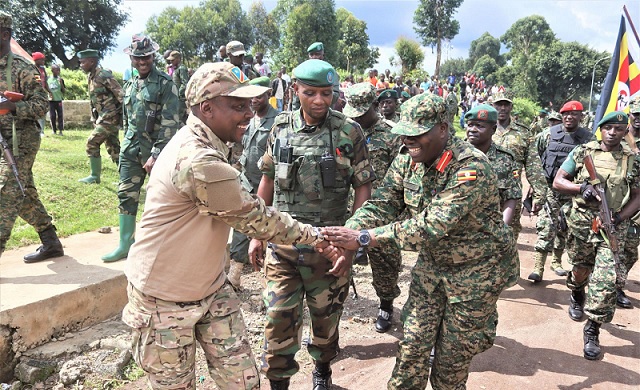
Kampala, Uganda | THE INDEPENDENT | The East African Community (EAC) summit sitting in Burundi’s capital Bujumbura has recommended Rumangabo, Rutshuru territory as the pre-cantonment site for the March 23 Movement (M23) rebels.
Initially, EAC Heads of States summits had asked for a cease-fire between the M23 rebels and Armed Forces of the Democratic Republic of Congo (FARDC) soldiers and militia coalition.
During the summit heads of state asked rebels to withdraw from all captured positions in Rutshuru, Nyiragongo, and Masisi territories. DR Congo government pushed the demand that rebels withdraw to the hills of, Runyoni, Tchanzu, and a forest in Sabyinyo mountain, Virunga national park.
Though rebels agreed to withdraw from captured positions, they resisted heading to, Runyoni, Tchanzu, and a forest in Sabyinyo arguing that FARDC may violate the cease-fire resolutions and launch attacks similar to what happened in 2012. They also argued that living conditions in the areas are unfavorable.
During the 21st Extra-Ordinary Summit leaders who attended opted to recommend Rumangabo to be the new pre-cantonment site. Leaders say that it is also impossible for rebels to be pre-cantoned in Kitchanga because locals are very hostile against them.
During the summit, it was also recommended that M23 rebels be integrated into the Nairobi dialogue. The summit also recommended the deployment of the investigation team in the various sites where there were allegedly massacres.
According to the recommendation, the international investigation team will include the International Conference on the Great Lakes Region (ICGLR), the African Union, the Southern African Development Community (SADC), and the United Nations.
The Congolese Minister of State in charge of Regional Integration, Mbusa Nyamwisi argued that M23 rebels should not be included in the investigations team because it is not a state.
Lawrence Kanyuka, M23 rebels’ Political Spokesperson said that as a movement, they are concerned about continued exclusion from the political process. He says that including the movement, may help in raising concerns about how the DRC government is embedding militia groups into the national army but M23 is not included.
Meanwhile, Ugandan troops operating under the East African Regional Force in North Kivu province have rehabilitated a water pipe that had broken and caused a water crisis in Rutshuru territory for the last two years.
The Deputy Head of Uganda Continent Engineering Component, Captain Elias Arinaitwe said that due to broken pipes, water had stopped flowing from the source to the main reserve tank for distribution to the community. He adds that troops have also fixed new taps to avoid congestion at collection points.
“The job was tedious but we had to dig out and trace for the breaking point and fixed a new pipe to join the broken piece to ensure that water flows from the chamber to be distributed to the reserve tank. Water is now flowing and the community can now safely use clean water than before. The team also fixed new taps to avoid congestion at collection points”, said Arinaitwe.
Kakosi Ngagijimana Ndianabo, the local Chief of Rutshuru territory says that the challenge had affected Niongera, Bwironde, Ruweze, Kiwanja, Rutshuru, and Kinyandoni towns. He says that for all two years, locals would only depend on dirty stagnant contaminated water. As a result, some battled water bone diseases like bilharzia, Typhoid, dysentery, and diarrhea.
Eric Bahati, the Chairman of the water management committee in Rutshuru territory applauded the UPDF for taking the community concerns seriously in an effort to solve the water crisis.
He urged the community to protect and keep the water facility clean and guard it jealously from any damage.
*****
URN
 The Independent Uganda: You get the Truth we Pay the Price
The Independent Uganda: You get the Truth we Pay the Price



